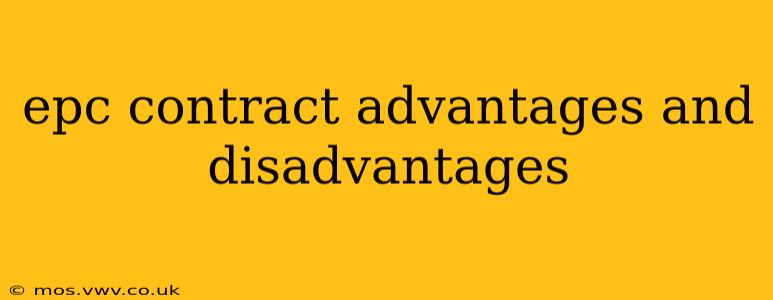Engineering, Procurement, and Construction (EPC) contracts are a popular choice for large-scale infrastructure and industrial projects. They offer a streamlined approach by consolidating responsibility for design, procurement, and construction under a single contractor. However, like any contractual arrangement, EPC contracts come with their own set of advantages and disadvantages. This guide will delve into both sides, providing a comprehensive understanding to help you make informed decisions.
What is an EPC Contract?
Before exploring the pros and cons, let's define what an EPC contract entails. In an EPC contract, a single entity (the EPC contractor) takes on the responsibility of:
- Engineering: Designing the project according to the client's specifications and relevant regulations.
- Procurement: Sourcing and purchasing all necessary materials, equipment, and services.
- Construction: Building and commissioning the project to meet the agreed-upon standards and timelines.
This "turnkey" approach simplifies the project management process for the client, reducing their involvement in the day-to-day complexities of the project.
Advantages of EPC Contracts
Several key advantages make EPC contracts attractive for many project owners:
-
Single Point of Contact: This is perhaps the most significant advantage. Dealing with a single contractor simplifies communication, coordination, and accountability. Instead of managing multiple subcontractors, the client interacts with one entity responsible for the entire project lifecycle.
-
Reduced Project Risk: The EPC contractor bears significant risk, including design flaws, cost overruns, and schedule delays. This transfer of risk can offer peace of mind to the client.
-
Faster Project Completion: The streamlined process and integrated approach of an EPC contract can often lead to faster project completion compared to traditional methods. This is because the contractor is incentivized to complete the project efficiently.
-
Cost Certainty (Potentially): While cost overruns are still possible, a well-structured EPC contract can provide a more predictable budget compared to traditional contracts where costs can accumulate from various subcontractors. A fixed-price EPC contract is particularly attractive in this regard.
-
Improved Project Quality: The integrated approach encourages a focus on overall project quality. The EPC contractor is incentivized to deliver a high-quality outcome to maintain their reputation.
Disadvantages of EPC Contracts
Despite the numerous advantages, EPC contracts also present certain drawbacks:
-
Higher Initial Costs: The upfront costs associated with EPC contracts can be significantly higher than traditional contracts, as the contractor needs to cover their design, procurement, and construction costs.
-
Limited Client Control: Clients often have less direct control over the project's day-to-day execution compared to traditional methods. They rely heavily on the EPC contractor's expertise and judgment.
-
Potential for Disputes: Disputes can arise regarding design changes, cost overruns, or schedule delays. Resolving such disputes can be complex and time-consuming.
-
Contractor's Expertise is Critical: The success of an EPC project relies heavily on the contractor's competence and experience. Selecting an unsuitable contractor can lead to significant problems.
-
Hidden Costs: While EPC contracts aim for cost certainty, unforeseen circumstances or changes in design can still lead to unexpected costs. Thorough contract negotiation and risk management are essential to mitigate this risk.
What are the main risks involved in EPC contracts?
The main risks in EPC contracts typically revolve around:
-
Cost Overruns: Unforeseen challenges, design changes, or inaccurate estimations can cause costs to exceed the agreed-upon budget.
-
Schedule Delays: Delays can result from various factors, including supply chain issues, unforeseen site conditions, or contractor inefficiencies.
-
Quality Issues: If the EPC contractor doesn't adhere to quality standards, the final product may not meet expectations.
-
Contractual Disputes: Disagreements over scope, payment terms, or responsibility for changes can lead to lengthy and costly disputes.
What are some common clauses in EPC contracts?
EPC contracts typically include clauses related to:
- Scope of Work: A clear and detailed definition of what the contractor is responsible for.
- Payment Terms: How and when payments will be made to the contractor.
- Dispute Resolution: Mechanisms for resolving disagreements between the client and contractor.
- Termination Clauses: Conditions under which the contract can be terminated.
- Liability and Insurance: Allocation of liability for accidents, damages, and other risks.
How to mitigate risks in EPC contracts?
Effective risk mitigation requires careful planning and execution:
- Thorough Due Diligence: Choose a reputable and experienced EPC contractor with a proven track record.
- Detailed Contract Negotiation: Ensure the contract clearly defines scope, responsibilities, and payment terms.
- Strong Project Management: Maintain close communication and oversight throughout the project lifecycle.
- Regular Progress Monitoring: Track progress closely to identify and address potential issues early.
- Risk Allocation: Clearly define and allocate risks between the client and contractor.
By carefully weighing the advantages and disadvantages, understanding the inherent risks, and implementing effective mitigation strategies, clients can successfully leverage EPC contracts to deliver complex projects efficiently and effectively. Remember that expert legal advice is crucial when negotiating and executing an EPC contract.
